Enhanced TDS
Identification & Functionality
- Chemical Family
- RTU Product Type
- Technologies
- Product Families
- Base Compound
Ethyl - 2 - cyanoacrylate
Features & Benefits
Applications & Uses
- Markets
- Applications
- Application Area
- Compatible Substrates & Surfaces
- Segment
- Solvent Resistance
Solvent Example Resistance Alcohol Ethanol, Methanol Very Good Ester (aliphatic) Ethyl Acetate (Acetic Acid Ethyl Ester) Very Bad Ketones Acetone, Benzophenone Very Bad Aliphatic hydrocarbons (alkanes) Petrol, Heptane, Hexane Good Aromatic hydrocarbons Benzene, Toluene, Xylene Good Halogenated hydrocarbons Methylene Chloride, Chloroform, Chlorobenzene Very Bad Weak acqueous acids Diluted Nitric- , Muriatic-, Sulfuric- , Phosphoric Acid Very Good Concentrated acid Nitric Acid, Muriatic Acid, Sulfuric Acid, Phosphoric Acid Very Bad Weak acqueous bases Diluted Sodium Hydroxide -, Caustic Potash Solution Very Good Concentrated bases Sodium Hydroxide -, Caustic Potash Solution Very Bad Water Good Iso-propanol Very Good Acetone Very Bad Mineral oil Good - Clean Surface
The surface condition of the mating parts has an enormous influence on the success of a bond. To achieve good bonding success the mating parts should be clean.
- LINOP Equipment
Cyberbond offers by means of the LINOP Equipment range suitable dosing and LED based curing devices. We also refer to suitable dosing tips which help an economical use of the adhesives (also if used manually).
Properties
- Appearance
- Transparent (Polymer), Opaque (Monomer)
- Physical Properties
Value Units Test Method / Conditions Set Time (acrylonitrile butadiene styrene) 7 - 13 s - Set Time (Ethylene Propylene Diene Monomer) 6 - 16 s - Set Time (Metal - Steel) 30 - 90 s - Set Time (wood - beech) min. 40 s - Service Temperature Range -55 - 95 °C - - Typical Properties
Value Units Test Method / Conditions Shear Strength*** 5200 psi - Relative Humidity 40 - 70 % - Temperature Range -67 to 203 °F - Fixture Time 30 sec - Viscosity (at 20°C, 160 rpm) 2000 - 4000 mPa.s Cone-plate - Cured Properties
Value Units Test Method / Conditions Strength of Cured Adhesive (Nitrile Butadiene Rubber) 5 - 12 N/mm² - Strength of Cured Adhesive (steel) 18 - 28 N/mm² - - Uncured Properties
Value Units Test Method / Conditions Density (at 20°C) 1.06 g/cm³ - Flash Point 85.0 °C - - Note
- *** Performance of cured adhesive on Stainless Steel
Regulatory & Compliance
- Certifications & Compliance
- Specification
- ISO 10993-5: Test for in vitro cytotoxicity (biocompatibility).
- NSF: (Nonfood Compounds Registration Program) This product is acceptable for use as an instant adhesive in food processing facilities.
- This product must only be used in a manner as to ensure it will have neither direct nor indirect contact with food or potable water. Category Code: P1, Registration Number: 153550
- RoHS conform.
Technical Details & Test Data
- Technical Details
Hot Strength on Steel
% of RT strength, tested at temperature.
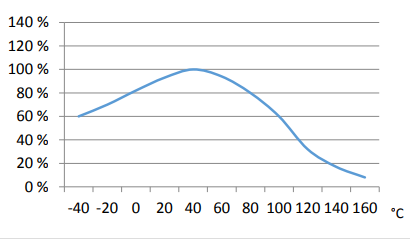
Time Until Full Cure
% of RT strength
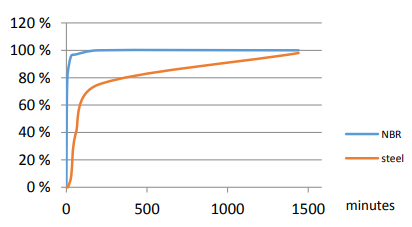
Strength of cured adhesive
Substrate N/mm2 NBR-rubber ▲ 5 to 12 steel 18 to 28 ▲ material failure
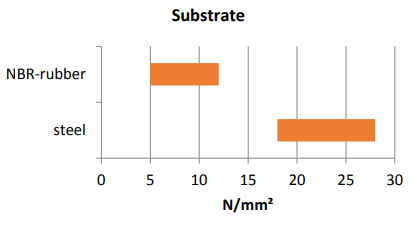
Heat Aging - on Steel
Tested at 20°C
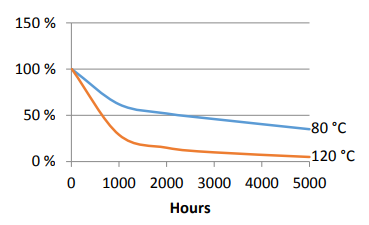
Durability after Storage under Changing Climatic Conditions
Test with stainless steel
Above freeze point 80%rel. humidity
Temperature range: -20 - 80 °C
Cycle count - 60Holding time at start temperature - 0
Heating up phase - 3
Keeping warm phase - 3
Cooling down phase - 3
Holding time at final temperature - 3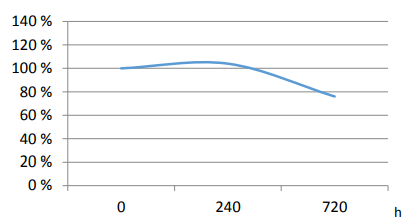
- Measurement of Viscosities
Viscosity describes the flow-ability of a liquid. Cyberbond measures the viscosity of the products by means of the cone/plate method: the liquid is applied on a panel and a defined cone presses the liquid together and rotates. You differentiate between a Newtonian and a thixotropic liquid. In terms of a Newtonian liquid you will get a relative constant viscosity graph in dependence of the rotary speed of the cone. In terms of thixotropic liquids the product becomes more liquid (down to its base viscosity) the faster the cone rotates. The viscosity is measured in mPa*s (milli Pascal x second) [SI system] or in cP (centipoise) [CGS- system]; 1 mPa*s = 1 cP. In order to allow products comparison all adhesives are measured at the same rotation speeds.
- Newtonian liquids at 160 upm
- Thixotropic liquids at 0,5 upm and at 160 upm
Temperature always is at 20 °C / 68 °F, if not mentioned to be different.
Safety & Health
- Potential Danger of Cyanoacrylates
You should care for the following:
- Use in well ventilated areas only
- Installll suitable exhaust systems in the workshop
- Apply material economically and use a dosing system where appropriate
- Allow a consistent relative humidity of 50 to 65 %; with regards to lower figures the polymerization will be delayed and monomer adhesive fume will appear
- If necessary: wear suitable, non-sucking gloves (Eg. No cotton)
- Keep adhesive out of reach of children
The data mentioned in this TDS, particularly the recommendations and use of products are based on our recent knowledge and experience. Due to the fact of having so many different materials involved and conditions of applications which are out of our influence, we strongly recommend to do sufficient tests in order to guarantee that Cyberbond products are suitable for the intended process and applications. Except for wilful acts any liability based on such recommendations or any verbal advice is hereby expressly excluded.
Packaging & Availability
- Country Availability
- Regional Availability
Storage & Handling
- Shelf Life
- 9 Months (at 20°C, unopened)
- Storage Conditions
Store products in a cold and dark place. Before use allow to reach ambident temperature.
